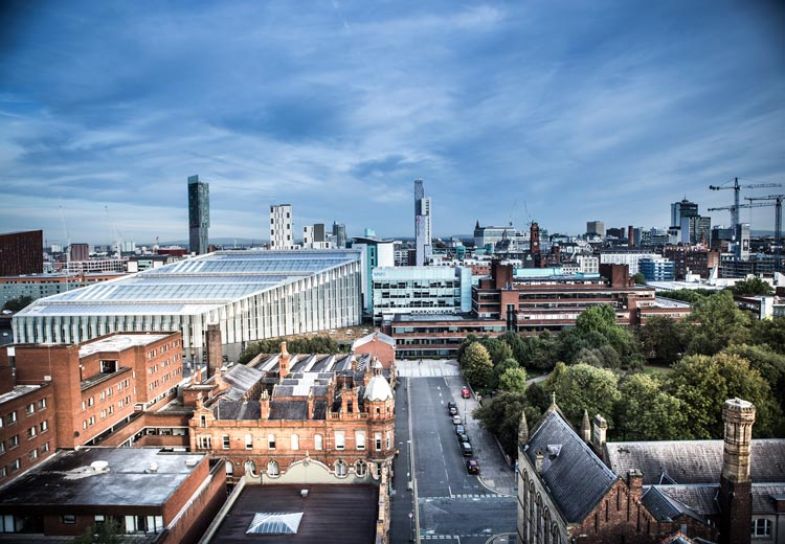
Manchester Metropolitan University announces ambitions to hire more than 40 professors for its areas of excellence
Nick Brook, Manchester Metropolitan University’s pro vice-chancellor for research, speaks to Times Higher Education about what brought him to the university, its vision and why he’s driving the recruitment of more than 40 new professors to support its commitment to research.
“I came to Manchester Met because of its drive, ambition and the staff’s commitment to delivering research with real impact,” Brook says. “Even when I first visited, I saw that in action, and it was verified by the recent Research Excellence Framework 2021 results.
“This is one of the highest-ranking modern universities and is mixing with research-intensive institutions. Over 80 per cent of our research from more than 740 academics is rated as world-leading or internationally excellent. We have eight subjects in the top 20 overall for the power of our research, with four in the top 10: art and design, education, English and sport.
“As well as these traditionally strong areas, across all research we’re also doing vital work to support policy and practice while making a difference to people and their communities. We’re consistently in the top five for knowledge transfer partnerships in the UK, with more than 80 projects worth £8 million that have delivered new products, services and value to regional SMEs and the national economy.”
The recent £400 million investment in the university’s estate also highlights Manchester Met’s commitment to research excellence. “We aren’t simply modernising old buildings and infrastructure. We’re creating an environment that’s up there with the best in the world,” Brook says.
“Over the past 10 years, we’ve opened award-winning buildings for education and health, a new business school, and an art school that was shortlisted for the RIBA Stirling Prize. Our new Institute of Sport – complete with MRI scanner – opened earlier this year, and a new £115 million superlab-equipped science and engineering building is under construction and due for completion in 2023.”
As part of Manchester Met’s research strategy, it is launching a campaign to attract professors with national and international standing who are looking for a supportive environment to achieve their academic goals. Although the university will continue to develop its own research leaders, bringing in fresh talent from elsewhere supports the institution’s plan to create critical mass around research excellence.
The university is investing in several research areas, including advanced materials, art, design and fashion, artificial intelligence, business and management, cardiovascular health, education and youth studies, health and social care, sport, and sustainability.
Brook notes that bringing academics together to understand and address society’s problems for a fairer and more resilient world can only happen through disciplinary-specific research. By way of example, he points to Manchester Met’s interdisciplinary work around ageing.
“In 10 years, 22 per cent of our population will be aged 65 and over, and the number of years we can expect to live in good health is declining. It will place intense pressure on healthcare and other systems as we adapt to this new reality. In looking at this problem, we bring cross-institutional expertise together to find ways of enabling our ageing population to lead healthy, independent lives for longer.
“For example, our biomechanics researchers have devised interventions that alleviate musculoskeletal deterioration, which improves the quality of later-life years. The research has informed the UK and international physical activity guidelines, which are used by GPs and health professionals. Our architects have introduced the concept of age-friendly neighbourhoods, which has been endorsed by the World Health Organisation and helps older people stay in their homes for longer. And researchers in our business school are tackling challenges related to the adult social care workforce to ensure older people get the support they need to continue to lead independent lives.
“Such a frictionless, collaborative and cross-departmental working environment is one that many outstanding academics across the country are looking for but don’t know where to find it. I say that Manchester Met is that university. It’s where they’ll be supported in their research and feel valued.”
He adds that the university’s location is also an advantage – both academically and in daily life. “This is one of the most vibrant cities in the world. There are booming tech and media sectors, a world-famous sports scene, and not forgetting that Manchester is one of just three Innovation Accelerators in the UK.
“Our location means that we’re firmly embedded in our community. We have partnerships across the region supported by a forward-thinking local government, and we also work with organisations ranging from ambitious SMEs to big-name global partners. Now, we want to attract the right people who share our ambition and enthusiasm to make a difference in the world – to lead our research with impact regionally, nationally and globally.”
Find out more about joining Manchester Metropolitan University as a professor.
